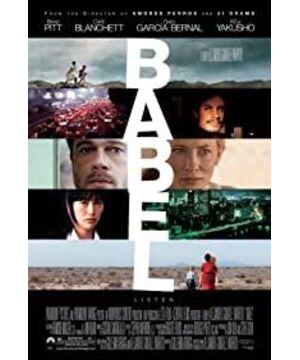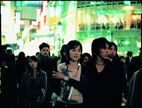The film "Babel" consists of three separate but interrelated stories: The
first is that two Moroccan mountain boys accidentally get a shotgun. Shot indiscriminately, wounding an American female tourist in the car.
Such a bizarre accident is regarded by the US government as a terrorist incident targeting American citizens. After going through many twists and turns, the female tourist was rescued by an American helicopter to Casablanca, and finally saved her life. The brother of the boy who shot was shot dead by Moroccan police.
The only positive gain from this accident is that the female tourist and her husband walked out of the shadow of discord in their life-and-death journey, and truly achieved the purpose of saving the marriage with a trip to Africa.
In the second paragraph, the host and the host of an American family both travel abroad, and the Mexican maid takes care of the two children at home alone. The maid's son was going to get married in his hometown, but the host didn't return, and the maid couldn't find anyone to take care of the host's children, so she had to take them back to Mexico for the wedding. When returning home that night to cross the US-Mexico border, the relationship between the maid and the child was questioned by the US border police. The maid's nephew drove to the border and fled, but in desperation, the maid and the child were still in the desert in the dark night. The next day, the maid was forced to leave the child under the shade of a tree and went to seek help alone. After the maid and child were rescued separately, the maid was deported for illegal labor status, interrupting her life in the United States that had lasted 16 years and placed more expectations.
In the third paragraph, a deaf-mute girl from a wealthy family in Japan was unhappy because she could not communicate with others normally. Finding a man to have sex seemed to be her last hope for communicating with others, so much so that she even invited a man to handle the case. The police visited late at night and showed their nakedness to the police. But the police dressed the girl solemnly and left her. The girl's father returned and found his daughter standing naked on the balcony. The father and daughter hugged each other silently on the balcony of the top floor in the dark night.
The first two stories are more directly connected. The two American children are the sons and daughters of a woman who was injured in Morocco. The connection between the third story and the first story is far-fetched. The shotguns that the two Moroccan brothers got were gifts from the Japanese mute girl’s father to the hunter when they were hunting in Morocco, and were later sold to the brothers’ fathers. .
I don't know what the original meaning of the Bible is, but what the "Tower of Babel" wants to express is by no means just the language barrier. In the first story, there is an interpreter between the American tourists and the local mountain people who can help them communicate in language, but the political, rich and poor, cultural and racial barriers make it impossible for them to communicate normally. and communication. In particular, the existence of the political shadow of terrorism makes a very accidental event completely impossible to pursue the truth. The Moroccan police spared no effort and was quick and efficient in tracing the murderer (quickly found and killed the suspect, and followed the trail of the shotgun all the way to Japan), and the indifference and inefficiency of the US and Moroccan governments in rescuing the injured women made the The gap between politics and human nature is absurdly dislocated and ruthless.
In the second story, the communication barriers between Mexicans and white American police are somewhat similar to last year's "Crash." What was so humane among Mexicans (the maid insisted that her nephew drive across the border late at night to take her and her two children home) hit the wall of American law. Under the seemingly conscientious law enforcement behavior of the American police, the undertone of discrimination that emerges from time to time cannot be concealed. No discriminatory language, no words or deeds that violated political correctness, institutional norms, and legal training are very effective. But that kind of emotional discrimination, which deliberately does not give any tangible expression in order to avoid political incorrectness, recognizes that there is a mutual reinforcement between the constraints of the system and real emotions. The dual identities of "whites" and "policemen" built a hard iron wall in front of the Mexicans.
In terms of a single passage, the Japanese story is more profound and meaningful. Although I don't know for sure how the situation of "unable to speak" brings about serious psychological obstacles to deaf people, and I don't know whether "making love" as the only hope for "ultimate communication" is indeed the reality of deaf people. Psychological, but the film's presentation of this psychological logic is undoubtedly successful and strong. So even though there are reports that the film was released in mainland China with only 5 minutes of cuts, I still suspect that the public release version will greatly weaken the original tension. If the dumb woman's unattractive nakedness is not presented on the screen, the sense of tragedy that she feels that even physical communication is not available will inevitably lose its power. The so-called "exposure footage needed for artistic creation" is a difficult "sophistry" to convince people in China, but this film is a good footnote. As for what kind of secrets are hidden in the mutilated and deformed family of the mute girl, because I have only read it once, I still dare not guess.
Strictly speaking, there is also a lack of organic connection between the first and second stories. The encounter between the couple in distress in Africa and the encounter with the two children and nanny in the United States is essentially two independent stories. The inner connection between them is actually the concept and image of "America". To Moroccans and Mexicans, "America" means the same image—wealth, opportunity, indifference and threat at the same time. The local panic that the two Moroccan teenagers caused by accidentally hurting others, the anger and fear their father showed, and even the death of one of his sons, can only be triggered by the image of "America". Among Mexicans, the image of America is roughly the same: rich, seductive, cold and hard. Such an external image is unaware of most Americans, whether it is an active and promising American soldier who sends democracy and freedom to people in other countries, or an American tourist who sends wealth to foreign people out of curiosity. What other roles do they play than liberators and generous benefactors. So it is inevitable that a Mexican director will break this layer.
Of course, the Mexican director did not turn his work into a denunciation of Americans, and if that were the case, the film's cognitive value would be greatly reduced. Americans are also victims of the separation and the "turmoil" created by "God". While Americans bring pressure and tension to aliens, they are also fearful and anxious about losing their sense of security. The biggest suspense and tension in the film is when the injured Americans can be taken to a civilized and safe place by a helicopter that drops from the sky, and whether their two children can safely leave the noisy, noisy, dirty Mexico. , full of uncontrollable dynamism and wild environments. During the entire viewing process, I always seemed to be enveloped in a kind of anxiety of "escape". It is not known whether real Americans have this "fleeing" fear, and if so, they are unfortunate. I reckon at least the GIs in Iraq have.
As for the third story being arranged in Japan, I think it is basically a strategic need. First, it can increase the language difference, echoing the original meaning of the "Tower of Babel" in the "Bible", and second, it can also enrich the visual elements and increase the number of films. ornamental. If you look at the director's confidant again, you can also say that choosing Japan as the background for the story is also an "intertextuality" with the United States. Due to the isomorphism of Japanese society and American society, expressing Japan is expressing the United States.
This film won only one music award at the Oscars. I don’t know if the Americans don’t understand it, or they don’t like the sharpness from aliens, or they just want to compensate Martin? Hopefully it's the latter.
View more about Babel reviews











